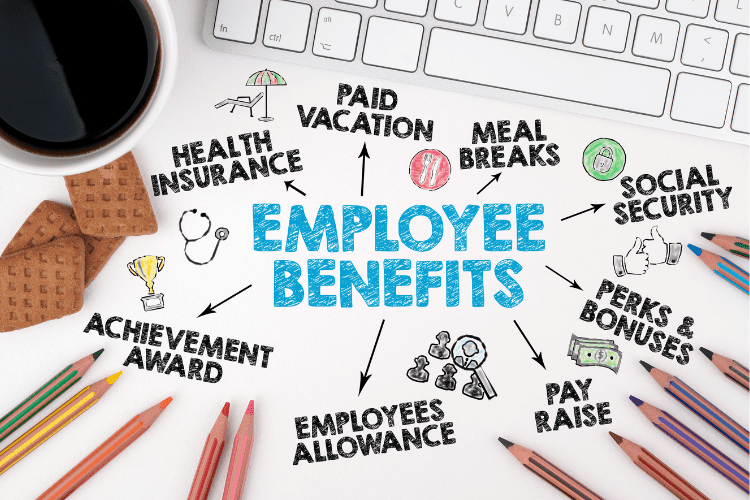Most Common Employee Benefits Explained

If you’re lucky, your job does more than just hand you a paycheck every other Friday. Many employers also offer non-salary employee benefits to keep their workforce healthy, happy, and motivated.
It’s essential to understand any benefits your employer offers so that you can take full advantage of each. Each benefit has the potential to influence your own quality of life and financial future positively.
Some employer benefits are called “fringe” because they are supplemental to your salary and not an essential part of the job. Fringe benefits include life insurance, free meals, use of company cars, stock options, childcare reimbursements, tuition assistance, and other perks. In contrast, other benefits – like health insurance – are mandated by federal law for companies of a specific size.
Health Insurance
Health insurance has long been controversial, partly because it’s so expensive. So thank your lucky stars if your employer offers decent health insurance coverage to you and your dependents.
You can likely choose from a few different insurance plans for basic health and medical care: to visit primary care physicians, specialists, hospitals, walk-in clinics, and urgent care/emergency rooms for a co-pay for each visit. Most (but not all) plans also cover prescription drugs and treatments.
However, more specialized insurance may be more iffy for vision and dental needs. Some employers offer them, while others don’t. Be sure to be clear on what the coverage, well, covers.
If you enroll, a portion of your paycheck automatically will go toward your health insurance premiums; your employer will cover the difference from company coffers. Just keep in mind that most companies require employees to work full-time to gain access to health insurance coverage. Other employers offer incentives to employees who waive health insurance coverage.
Your employer-based insurance is likely to be more economical and comprehensive than any coverage you could get on your own. That being said, you never know, so be sure to shop around. If you have a working spouse, compare his or her employer’s plan to yours.
Life Insurance
Life insurance may not be the most exciting employee benefit – after all, how can you compare it with free meals and a company car? – but it’s one of the most valuable to your family. Employer-provided life insurance takes an expense out of your budget – the premiums you’d pay for your own policy – helping to compensate your family would face in the event of your unexpected death.
An amount of coverage is provided free, often with the option to pay more to upgrade the policy’s value. Before you do that, though, you better shop around. Better deals may exist elsewhere. (But there’s certainly no harm in taking the basic policy.)
Employer 401(k) Plan Match
Most retirement savings experts consider investing in a 401(k) plan one of the must-have strategies for retirement planning. And its ace-in-the-hole is the company match.
A 401(k) is a retirement savings plan offered through your workplace. Contributions to it come directly out of your gross pay (reducing your taxable income) and can be invested as you request, usually into mutual funds offered by the plan.
Many employers who offer a 401(k) plan also agree to match up to a certain amount of every contribution the employee makes to their account. Some employers offer a dollar-for-dollar match, while others offer 50 cents on each dollar.
Regardless, it’s essentially free money that you should jump at the opportunity to take. Let’s say you make $1,000 every week and invest 10%, or $100, of that income into your 401(k). If your employer matches up to 6 percent of your income, they’re adding $60 to your 10 percent, and your $100 per week transforms into $160 without you doing anything extra! $160 turns into $320, which turns into $480; before you know it, you’ve amassed a significant retirement fund.
Flexible Spending Accounts
Many employers, especially large organizations, corporations, and business entities, offer flexible spending accounts (FSA) as an employee benefit.
An FSA allows you to set aside a portion of your pre-tax income to pay for medical and dependent care expenses. You won’t be taxed on the money; you can use it just like a checking or savings account to handle qualified expenses. Since your employer pays less payroll taxes for every dollar you invest into your FSA, it’s a win-win benefit.
You may be unable to find an employer offering every wonderful benefit possible. Still, you can use available employee benefits as one factor to consider when selecting a new job or negotiating a raise.
Read about micro-investing and how to get started with our complete guide: Micro-Investing: What It Is, Why It’s for You and How to Start.










